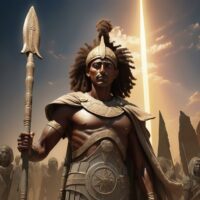Maher : God of War
Listen
At a glance
| Description | |
|---|---|
| Origin | East African Mythology |
| Classification | Gods |
| Family Members | Ashtar (Father) |
| Region | Ethiopia |
| Associated With | War |
Maher
Introduction
Maher, also known as Maḥrem, was the powerful war god of the ancient Aksumite civilization, which thrived in what is now Ethiopia and Eritrea between the 1st and 8th centuries CE. Central to Aksumite kingship and state religion, Maher represented military might, divine protection, and the unbroken legitimacy of royal authority. Before the adoption of Christianity in the 4th century CE, he stood at the heart of Aksumite ideology as the god who guaranteed victory in battle and safeguarded dynastic power.
Evidence of his importance is found in royal inscriptions, votive offerings, and dedications that portray Maher as the invincible patron of kings. In the process of interpretatio graeca—where local gods were equated with Greek deities—he was identified with Ares, the god of war, underlining his role as the embodiment of aggression and conquest. His prominence mirrors the Aksumite kingdom’s military expansion and the merging of traditional South Semitic beliefs with broader Mediterranean cultural influences.
Physical Traits
Direct artistic depictions of Maher have not survived, but ancient inscriptions and cross-cultural associations provide insight into how the Aksumites may have imagined him. As the Aksumite equivalent of Ares, he was likely envisioned as a warrior armed with a spear or sword, clad in armor, and radiating invulnerability. Texts repeatedly emphasize his status as “the undefeated,” a phrase that highlights his indestructible and dominant character.
The monumental stelae erected in Aksum, while not explicitly portraying Maher, reflect the martial and protective symbolism associated with his cult. Some scholars argue that the unique shapes of these monuments—possibly modeled after shields—echo the militaristic values tied to Maher’s worship. Thus, although no single image captures his form, the ideological aura surrounding him was unmistakably that of a fearsome, immortal guardian of kings and kingdom.
Family
Maher’s divine family structure reveals the cosmological order of pre-Christian Ethiopia. He was considered the son of Ashtar, a celestial deity connected with Venus, fertility, and supreme authority. Alongside him stood Beher, the god of the sea, and Medr, the god of the earth, creating a triad of divine powers that governed the sky, the waters, and the land.
This balance of elements gave Maher his rightful place as the executor of divine will on earth, the enforcer who translated cosmic order into political authority. Aksumite kings frequently referred to themselves as the “Sons of the Invincible Mahrem,” a title that directly tied their legitimacy to his divine parentage. Through this association, rulers presented themselves as chosen leaders whose victories were not just political achievements but sacred acts sanctioned by Maher himself.
Other names
Maher was worshipped under different names and titles depending on cultural and linguistic context. The most widespread local name was Maḥrem, a form preserved in Aksumite inscriptions. Modern scholarship often simplifies this to Maher for accessibility. When Aksumite rulers communicated with or described their beliefs to external audiences, particularly in the Mediterranean, they equated Maher with Ares Arevei, the Greek god of war, as recorded in the famous Monumentum Adulitanum.
These varying names highlight both the deeply rooted local devotion to Maher and the adaptability of his cult in a world of trade and cultural exchange. By presenting him as Ares, the Aksumites connected their own divine protector to one of the most recognizable gods of the Greco-Roman world, ensuring that foreign allies and rivals alike understood the sacred force backing the Aksumite throne.
Powers and Abilities
The core of Maher’s divine power lay in his role as the guarantor of military victory and protector of dynastic succession. His invincibility was not merely symbolic—it was invoked in royal inscriptions that credited him with decisive victories over enemy tribes and kingdoms. Kings dedicated offerings of statues, cattle, and even prisoners to Maher as acts of gratitude for triumph in war, reinforcing his image as the deity who ensured Aksumite supremacy.
Maher also functioned as the exclusive patron of kingship. While other gods were worshipped in the broader Aksumite pantheon, only Maher consistently received royal dedications, emphasizing his unique position as the guardian of the throne. In later centuries, as Aksumite religion showed tendencies toward monotheism, Maher began to absorb functions of other deities, becoming the central divine figure whose attributes encompassed protection, justice, and cosmic order. This gradual consolidation paved the way for the acceptance of Christianity, where divine kingship was reinterpreted under the Christian God.
Modern Day Influence
Though Maher’s cult declined after the Christianization of Aksum under King Ezana, his influence has not vanished. Echoes of his invincibility and divine kingship persisted in Ethiopian royal ideology, where monarchs continued to be seen as divinely chosen, even if under a Christian framework. The shift did not erase Maher’s role but rather reframed his attributes within the narrative of the Christian God’s authority.
Archaeologically, Maher’s legacy is preserved in inscriptions, temple ruins, and monumental stelae at sites such as Yeha and Aksum. These remnants provide invaluable insight into the pre-Christian religious landscape of Ethiopia and allow scholars to reconstruct the spiritual and political dynamics of the Aksumite world.
Comparatively, Maher enriches the study of global mythology. His role aligns with war gods like Mars in Rome, Ares in Greece, and Huitzilopochtli in Aztec tradition, revealing common patterns in how societies deified warfare and leadership. His case also illustrates how African civilizations engaged with wider networks of cultural exchange, blending indigenous beliefs with Mediterranean and Near Eastern influences.
In modern Ethiopian identity, Maher remains a symbol of antiquity and sovereignty. Historians and cultural commentators often invoke him as a reminder of Ethiopia’s deep historical roots and its proud legacy as one of the world’s earliest great civilizations. While no longer a figure of worship, Maher endures as a cultural emblem—his undefeated spirit woven into the narrative of a nation that has long resisted conquest and preserved its independence.
Related Images
Source
Encyclopedia.com. (n.d.). Aksumite Religion. Retrieved September 1, 2025, from https://www.encyclopedia.com/environment/encyclopedias-almanacs-transcripts-and-maps/aksumite-religion
Wikipedia contributors. (n.d.). Maher (god). Wikipedia. Retrieved September 1, 2025, from https://en.wikipedia.org/wiki/Maher_(god)
Encyclopaedia Aethiopica. (n.d.). Mährém. Sewasew. Retrieved September 1, 2025, from https://en.sewasew.com/p/ma-hre-m
Cambridge University Press. (n.d.). Aksumite Religion. In Foundations of an African Civilisation. Retrieved September 1, 2025, from https://www.cambridge.org/core/books/foundations-of-an-african-civilisation/aksumite-religion/0CCB9296542F76438C492FE09C527C5B
Aksumite Empire – New World Encyclopedia. (2008). https://www.newworldencyclopedia.org/entry/Aksumite_Empire
Piovanelli, P. (2014). Reconstructing the social and cultural history of the Aksumite Kingdom: Some methodological reflections. Academia.edu.





Thalia Wilderman
Your writing has a way of resonating with me on a deep level. I appreciate the honesty and authenticity you bring to every post. Thank you for sharing your journey with us.
Dave Zulauf
Your blog is a testament to your passion for your subject matter. Your enthusiasm is infectious, and it’s clear that you put your heart and soul into every post. Keep up the fantastic work!
Ethan Lowe
I have been surfing online more than 3 hours today yet I never found any interesting article like yours It is pretty worth enough for me In my opinion if all web owners and bloggers made good content as you did the web will be much more useful than ever before
Aracely Schroeder
Your writing has a way of resonating with me on a deep level. I appreciate the honesty and authenticity you bring to every post. Thank you for sharing your journey with us.
Tracy Dach
I do believe all the ideas youve presented for your post They are really convincing and will certainly work Nonetheless the posts are too short for novices May just you please lengthen them a little from subsequent time Thanks for the post
Murray Prosacco
Ive read several just right stuff here Certainly price bookmarking for revisiting I wonder how a lot effort you place to create this kind of great informative website